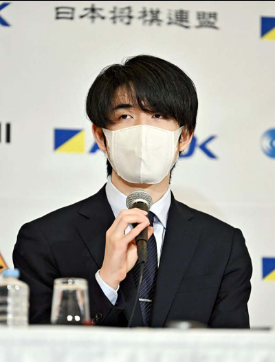 https://japannews.yomiuri.co.jp/society/general-news/20220215-12383/
https://japannews.yomiuri.co.jp/society/general-news/20220215-12383/
Sota Fujii eats for lunch and "wins all the games," a food that is too unexpected...!
But there is no need to be pessimistic. With the help of
today's stars and celebrities, we can surely break through the "blur
barrier.
Aggressive Selection of Local Cuisine
There have been many incredibly strong professionals like
Zenji Hanyu, but I think Rokugan Fujii has something that surpasses even
them," said Nobuo Mori, a professional Go player known as the mentor of
the late Sei Murayama. On March 19, he became the
youngest player in history to win the Sixth Crown by winning the
"Kiou-sen," one of the eight major Shogi titles. On
April 5, the Meijin Tournament will begin, and he is expected to be crowned as
the winner of the seventh title in the near future. Not
to be outdone by the heated battles between prodigies, the "Meishin"
that attracts public attention every time a title game is held is the
"Kachimeshi. It has become such a big news that all the media outlets are
reporting on what Fujii ate at the time of the game. This
cannot be underestimated as a mere incident. An analysis of Fujii's meals
during title games reveals that they are beneficial to the brain.
Sota Fujii drinks a lot of coffee, but ......
For example, let's take a look at the meal he ordered on
March 19, the day he won the Ki-o title. Morning snack: -
Iced coffee - "Kinu no Seiryu" (a famous confectionery from Nikko,
Tochigi, where the hotel where he played is located) <Lunch> - Kanuma
chives with egg and pressed sushi with yashio trout <Afternoon snack> -
Orange juice - Iced lemon tea Fujii is an extremely frequent drinker of iced
coffee. This year, he has ordered iced coffee for 12 of the 16 games in which
he took a snack in the morning. And coffee helps prevent dementia. According to a study published in '09 by a Finnish university
and a Swedish research institute, people who drink three to five cups of coffee
a day have about 60% less risk of developing Alzheimer's disease than those who
did not drink at all. Caffeine has been reported to
promote the removal of amyloid-β, a substance that causes dementia," said
Yasuhiro Sonoda, director of Tokyo Memory Clinic Kamata.
Local specialties are also effective in preventing dementia!
As can be inferred from its name, the "Kanuma chives
with egg and pressed sushi with yashio trout" for lunch is a dish using
local ingredients. In many cases, prestigious local hotels
and traditional Japanese inns are used as venues for title tournaments for the
purpose of promoting Shogi and other activities. Regardless
of the venue, many professionals eat light meals such as soba or udon at title
tournaments. Among them, I have the impression that Ryuoh Fujii is very active
in eating local specialties," said Mr. Teru Ogasawara, a Shogi-meshi
(Japanese chess) researcher. He was a man who liked to eat local specialties
from each region. This preference for regional specialties also has a
brain-effecting element. Takeshi Nishi, a brain scientist
and author of "What People Who Are 80 Do When Their Brains Aren't
Aging," says, "Locally grown food is fresher and more delicious. Locally grown food is more likely to be fresh, so it is better
suited to prevent dementia in that it is 'unoxidized. Conversely,
if you eat oxidized foods, your blood is also more likely to be oxidized,
increasing the risk of blood vessel rusting. This is not recommended because of
the risk of leading to atherosclerosis, which increases the risk of
cerebrovascular dementia." There are some concerns about the afternoon
snack (orange juice and iced lemon tea) as well. Basically, other professionals
eat snacks paired with drinks, but Fujii asks for two drinks without snacks.
This year, he chose "2 drinks without snacks" in 9 out of 16 games
where there was an afternoon snack. In addition, the pattern is often that both
drinks ordered are citrus-based.
Lunch curry is "all win
Dr. Hidetoshi Endo, a dementia specialist, says,
"People who frequently consume citrus fruits are less likely to develop
dementia. The component in citrus fruits called nobiletin
is known to have antioxidant and anti-inflammatory effects. However, grapefruit
must be consumed with caution, as it may cause life-threatening side effects if
taken together with antihypertensive Ca channel blockers. This
is not the only hidden tendency in Fujii's winning meals. The winning
percentage is unusually high when he eats curry. When Fujii plays games in
eastern Japan and chooses curry for lunch, his winning rate is 100% (20 wins in
20 games). The spice used in curry, turmeric, contains an
ingredient called curcumin. Curcumin prevents the aggregation of amyloid-β. In
a study of elderly people living in Singapore, it was reported that those who
ate curry at least once a month had half the risk of developing dementia
compared to those who did not eat curry at all.
Activating the Brain with Food
Another characteristic of Fujii's staple diet is that there is no bias in his winning meals. Some professionals eat a certain dish before a game as a good luck charm, but this is not the case with Fujii. In an interview in March, Fujii said, "I choose what I want to eat according to my mood. In fact, this attitude is what helps the brain. Dr. Ayumi Okumura, neurosurgeon and chairman of the Okumura Memory Clinic, explains. The purpose of eating is not only to get nutrients. If we become stuck in a rut of eating the same foods all the time, the brain loses its stimulation. The act of eating whenever you find something that interests you stimulates your intellectual curiosity and activates your brain.
From the April 1 and 8, 2023 issues of Weekly Gendai
Source: https://news.yahoo.co.jp/articles/b23951a461713aaf7c03609005cfc87668956d40?
 English
English Japan
Japan
